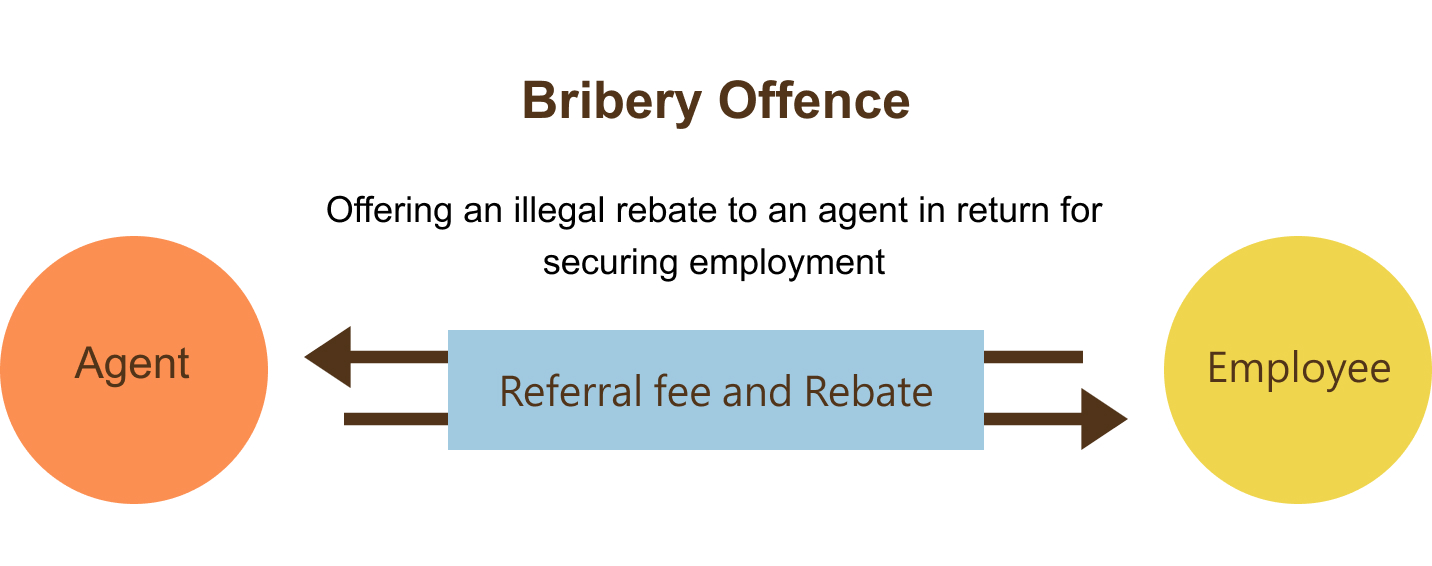Chapter 4
The Investigation file
Complainants? Victims?
The complainants of Indian descent were each solicited $3,000 as referral fee for getting a job at a construction site through their clansman who was the site foreman. Feeling aggrieved at being fleeced for their hard-earned money, the two victims decided to lodge a complaint with the ICAC.
During an interview, the first complainant said that $1,000 had already been paid to the foreman as referral fee, while the second complainant said he had never done so. Thinking that it was a “trade practice” to pay referral fees to the foreman who secured jobs for them, they did not know it was against the law to offer an advantage to an agent (the foreman) without the permission of his principal (the engineering company).
Though the reliable evidence provided by the two complainants, who were also victims, was very important, a successful conviction was heavily dependent on whether they would testify against the foreman in court. Approval was then sought from the Department of Justice (DoJ) to grant immunity from prosecution to the first complainant, and to make both of them as prosecution witnesses.
This is what we see in a typical scenario in TV dramas: an accomplice willing to assist the prosecution by acting as a “tainted witness” will be granted “amnesty” by the Judiciary. Such a procedure is known as “immunity from prosecution”.
In principle, it is desirable that the criminal justice process should operate without the need to immunise witnesses in exchange for testimony against other criminal co-offenders; however, it is considered to be an appropriate course in some cases. As a general rule, an accomplice should be prosecuted, irrespective of whether or not he or she is to be summoned as a witness. The preferable course is for a cooperating accomplice to be dealt with after the trial, and ordinarily he or she will receive a discount on sentence to reflect the nature and extent of his or her cooperation.
In some areas of law enforcement, a successful prosecution will be dependent on or greatly assisted by the evidence of an informer. An informer should be used as a prosecution witness only if the interests of justice demand it. That requires a balance to be struck between the interest of the community in securing the conviction of an offender and the awarding of a benefit to a person who may be closely associated with the offending and perhaps criminally involved in it. Ordinarily the evidence to be given by the informer should be considered necessary to secure the conviction of others and not be available elsewhere.
In certain exceptional circumstances, a witness may be granted immunity from prosecution by the DoJ. The decision to grant an immunity and the balancing process involved will be influenced by:
In this case, the success of conviction depended entirely on the assistance and evidence provided by the complainants. After considered the above factors, the ICAC then sought DoJ’s approval to grant immunity from prosecution for the bribery offence committed by the first complainant. Considering that the first complainant’s evidence was essential for the conviction of the defendant, the DoJ decided to grant an immunity from prosecution to the witness in writing, and copies of which were made available to the defence before trial and to the court at trial.
Referral fees and rebates are defined as advantages under the POBO. Offering an illegal rebate to an agent in return for securing employment may constitute a bribery offence. An agent is prohibited from accepting any advantages or commissions in relation to work unless prior approval is obtained from his or her principal (i.e. employer of the engineering company). Therefore, in this case, both the offeror and recipient of the bribe committed an offence under the POBO.
Trade practice or custom is not a defence for the offer or acceptance of a bribe, even though the first complainant of Indian descent, who has only resided in Hong Kong for a short period of time, misbelieved that the payment of referral fee to the middleman was a trade practice. According to section 19 of the POBO, the excuse cannot be relied on as a defence for the offer and acceptance of an advantage, and the court will only consider whether permission has actually been obtained from the recipient’s principal.

Collecting evidence
With the grant of an immunity from the DoJ, the ICAC immediately started to gather further evidence of corruption together with the two complainants.
With the help of the first complainant, the ICAC investigating officers could make a hidden video camera hidden on his body before going to work every day. He also brought with him $2,000 in the hope of video recording the whole process if he met the foreman at the construction site, who pressed him for the outstanding payment.
Since inducing another person to commit a crime for collection of evidence was not allowed under the law, the first complainant could only rely on “sheer luck” to see if he could accidentally bump into the foreman at the construction site, and if the foreman would press him for the outstanding amount on his own initiative.
However, even though the first complainant carried a hidden body camera at work every day, he could not meet the foreman in the following two weeks since the latter happened to be working at another construction site. In order to avoid further complications and not to have more people falling victim to extortion by the foreman, the ICAC decided to mount an arrest operation although there had been no video-taped evidence of acceptance of bribes so far!